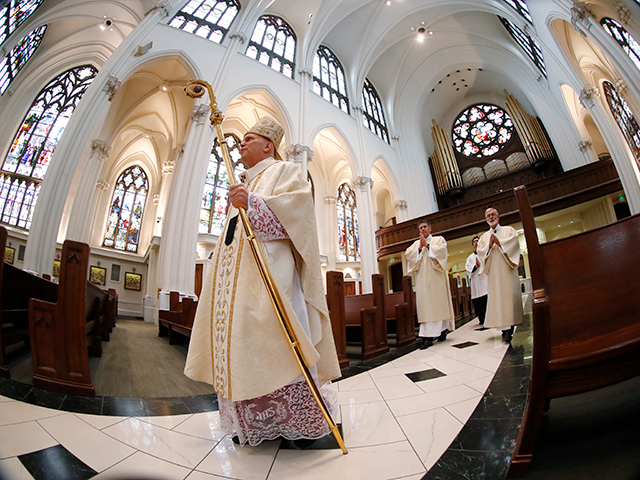More than 25 Catholic parishes and ministry centers in and around Denver have been vandalized, looted, targeted by arson or desecrated in the past 21 months, Denver Archbishop Samuel J. Aquila reported Thursday.
In a Washington Post op-ed coauthored with Tim Busch, chairman of the Napa Institute, Archbishop Aquila notes that Denver’s Cathedral of the Immaculate Conception was recently profaned with the words “Satan lives here” spray-painted in blood-red on the main bronze double doors.
Along with this message was other “hateful graffiti,” the archbishop writes, including swastikas, scattered across the cathedral grounds.
Anti-Catholic vandalism is so widespread in the U.S. now that one would “have to go back to the early 20th or late 19th centuries, when an influx of Catholic immigrants challenged a mostly Protestant culture, to find so much public antagonism toward the Catholic Church,” the op-ed declares.
Last month the U.S. Conference of Catholic Bishops expressed dismay over the 100th recorded act of anti-Catholic vandalism, arson, and destruction since they began tracking the phenomenon in May of 2020.
“These incidents of vandalism have ranged from the tragic to the obscene, from the transparent to the inexplicable,” declared New York Cardinal Timothy Dolan, chair of the Bishops’ Committee for Religious Liberty, and Oklahoma City Archbishop Paul Coakley, chair of the Committee on Domestic Justice and Human Development, in a joint statement.
“These are not mere property crimes,” the bishops declared. This is “the degradation of visible representations of our Catholic faith. These are acts of hate.”
In Wednesday’s op-ed, Archbishop Aquila and Tim Busch observe that anti-Catholic attacks on religious sites have been accompanied by a wave of violence and vandalism against Mormon temples, African American Christian churches, Buddhist temples, Muslim mosques, and Jewish synagogues and cemeteries.
“Hate crimes, which include religiously motivated attacks, will likely set a 20-year record in 2021,” they state.
These “horrifying attacks” are indicative of a spiritual and cultural crisis, they write. “People of goodwill, whether religious or not, must condemn and confront the societal trends that encourage attacks on houses of worship — trends that extend far beyond religion.”
America has long been a place where different people with different views could “coexist in peaceful communities,” they note, but now respectful conversation “has given way to spiteful confrontation, and the long-standing attitude of live and let live is being replaced by live as I want you to live.”
“Where once people strove for change through the force of intellectual, moral and well-considered arguments, the go-to approach for many is now brute force,” they add. “It often takes the form of violence or vandalism.”
“Everyone has a role in lifting America out of this crisis,” Aquila and Busch conclude. “Regardless of our individual beliefs, we must regain respect for the dignity of the human person.”

COMMENTS
Please let us know if you're having issues with commenting.